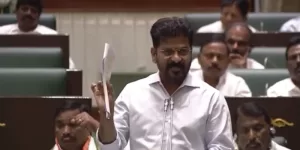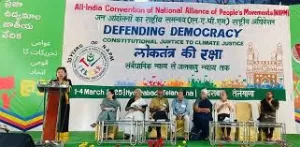[On this day in June 25, 1975, Emergency was declared by the Indira Gandhi government, but for Lalu Prasad Yadav, on June 25, 2023, an undeclared Emergency is afoot thanks to the excesses of the Narendra Modi government.
Lalu was in the forefront of the Jayaprakash Narayan-led movement during the seventies. In his interactions with me, excerpts from which made their way to the biography Gopalganj to Raisina: My Political Journey, the Rashtriya Janata Dal president noted how parallels exist between the Emergency of 1975 and the conditions of today.
Some of his observations are given below. Notes from me are in italics.
– Nalin Verma]
“India today is reeling under an undeclared Emergency. The very idea of India enshrined in the constitution is under threat. People and political parties are uniting against the spell of this undeclared Emergency.
We (all the opposition parties) are under pressure from the people all across the country to unite and dislodge the Narendra Modi government so that the undeclared emergency comes to an end and the people can breathe in free air. The oppositions’ conclave at Patna on Friday-June 23- was also an expression of the people’s wish to fight collectively against the dictatorial regime of Modi.
“Though there is no official censorship, several media houses, owned by major corporates, hesitate to air opinions or shows that are unpalatable to the Modi government. Let me draw a parallel between the Emergency of 1975 and the undeclared one today.
Prime Minister Indira Gandhi had resorted to constitutional provisions to declare Emergency in India. That Emergency was different from the present spell in the sense that Indira ji put many of us behind bars, but she never abused us. Neither she nor her ministers or party leaders ever called us ‘anti-national’ or ‘unpatriotic’.
She never unleashed vandals to defile the memory of Baba Saheb Bhimrao Ambedkar – the architect of our constitution. She didn’t unleash lynch mobs to kill and maim minorities and Dalits in the name of religion and caste. Cattle-traders were not persecuted and killed on doubts of possessing beef.
Journalists and writers were put behind bars and were released later. They might have been tortured in jail but they were not shot dead in cold blood.
Her ministers didn’t loiter around Jawaharlal Nehru University (JNU) and other educational institutions to question the morality of young students. Activists, writers and people at large defied the Emergency and dissented with Indira ji and her policies. But she didn’t ask anyone to go to Pakistan.
I was a young student leader and was one of the fiercest critics of the dictatorship at that time. But given my understanding of Indira ji and her regime, I can say with certainty that she would never have tolerated her ministers and party workers asking people to go to Pakistan.
The assassins of Mahatma Gandhi were not worshipped during the 1975 Emergency. Boys and girls were free to choose partners of their choice. They were not persecuted in the name of ‘love jihad’.
Indira Gandhi never spread superstition. She never said that Lord Ganesha had got an elephant trunk through plastic surgery. She made India a nuclear power. The Indian Army during her days as the prime minister defeated Pakistan and created Bangladesh in 1971. But she behaved like a statesman.
Dignified in defeat
Our Janata Party defeated her in 1977. She battled hard against us and regained power in 1980. She travelled through Bihar and other parts of India during her campaign, but she didn’t utter blatant lies. She didn’t make false promises. She never said she would give two crore jobs every year to the youth or deposit Rs 15 lakh into the accounts of every Indian. She didn’t promise achhe din (good days) and unleash lynch mobs to bring about bure din (days of trouble) on the minorities and the Dalits either.
JP’s movement was not directed against any individual. It was against the regime of that time.
The Sangh Parivar leaders had played a dubious role then and JP never liked them. He asked them to disassociate themselves from the RSS to get into the Janata Party based on his principles of socialism, equality and justice. The Sangh Parivar never abided by JP. They used the movement to gain recognition in society. They feared being jailed and did not participate in the jail bharo campaign.
Lalu had been arrested under the Maintenance of Internal Security Act (MISA) and stayed in jail for nearly two years during the JP movement. Nitish Kumar, Shivanand Tiwary, Bashishtha Narayan Singh and several of Lalu’s colleagues in the JP movement too stayed in the prison for months.
But today they are playing the victim card against the Emergency.
I laugh when some Union ministers narrate how ‘bravely’ they fought during the Emergency. I was the chairman of the steering committee of the movement that JP had constituted. My colleagues Shivanand Tiwary, Nitish Kumar, Bashishtha Narayan Singh and I in the steering committee didn’t even know many of the ministers in the Modi government who talk so much about the Emergency today.
We had not heard of Narendra Modi, (Arun) Jaitley or Venkaiah Naidu during the Emergency.
Political leaders
A political leader who made his presence felt during the Emergency and whom Lalu had the utmost respect for after Jayaprakash Narayan was former Prime Minister, Chandra Shekhar.
Chandra Shekhar was in the Congress. Indira Gandhi could have made him a top minister had he wished. But Chandra Shekhar ji quit the Congress to join the JP movement. He was like an elder brother to me. I respected him as an elder brother and also my leader as long as he lived.
The RJD president also named Karpoori Thakur, George Fernandes, Madhu Limaye, Madhu Dandavate, Sharad Yadav and others with respect.
People like L.K. Advani and Murli Manohar Joshi were committed to the RSS’s Hindutva ideology. They had joined the movement to earn respect and recognition among the people which they didn’t have then but they were more loyal to Nagpur than to the cause of the constitution and democracy that the JP-led movement espoused.
RSS-ABVP
In the initial stages of the agitation, JP gave a jail bharo (fill the jail) call and asked me to arrange for students to court arrest in large numbers. The movement was still in its nascent stage and only a few people were ready to go to prison. I organised a group of 17 persons – mostly belonging to the ABVP-RSS – and brought them to Patna. I promised them a feast of puri and jalebi too, at my friend’s home. I put them on a police bus which carried them to Buxar jail. But as the bus neared Buxar jail, all the 17 activists fled. It is true that I had ensnared them with false promises, but the manner in which they had run away on seeing the jail says enough about their commitment to JP’s cause.
The news that the movement ‘activists’ had fled in a cowardly manner reached Patna. Acharya Ram Murti, a veteran freedom fighter and associate of JP, summoned me and expressed concern at the attitude of the 17 activists and suggested that I meet JP. I was nervous.
I faced JP with an innocent expression and said, ‘Babuji! The 17 student activists did not actually flee. They had somehow learned that you had fled from Hazaribagh jail in 1942 and successfully carried out an underground movement against British rule. They tried to emulate you.’
JP just smiled. Perhaps he had seen through my act. Thus, I defended the ABVP activists despite their treachery. But that did not stop them from seeking to backstab me every time they got an opportunity.
The RSS-BJP was full of vengeance against me when I was a 22 or 23-year-old student leader. They are full of the same against me when I am in my 70s.
(Lalu Prasad Yadav is a former chief minister of Bihar and a former Union minister. Nalin Verma is a senior journalist and co-wrote Lalu’s biography, ‘Gopalganj to Raisina: My Political Journey’. Courtesy: The Wire.)




